Erstellt am: 4. 12. 2015 - 15:30 Uhr
Do We Live In A Businessocracy?
There are said to be 30,000 lobbyists active in Brussels – influencing, according to the group Corporate Europe Observatory, three-quarters of the European laws that govern our lives. The scale is enormous. I’m trying not to think of a full football stadium of men and women in smart business suits screaming down on the 751 MEPs squatting on the pitch.
For this Saturday’s Reality Check "Businessocracy?" I’ve been looking beyond the clichés and exploring the world of EU lobbyists: the good, the bad and the ugly.
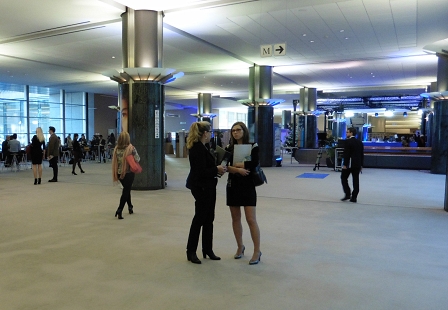
Chris Cummins
Let’s start with the good. The first thing to point out is that much of the lobbying is solicited, points out James Panichi, who reports on transparency, governance and lobbying for the recently launched POLITICO.eu: "Often officials themselves seek out the input of industry because they say they need to get the decisions right. They don’t want to make uniformed decisions that would damage the industry."
"We are information transmitters"
With these issues I find there is a danger of falling into lazy anti-business rhetoric. The terms "corporate" and "industrial" often seem imbued with negative connotations. The terms "employment" or "job security" are not, and, at a time of record youth unemployment, corporate lobbyists themselves argue they prevent decision makers from taking decisions that would harm your chances of getting or keeping hold of your job. They see themselves as warriors against red tape in a competitive world.
"We understand ourselves as information transmitters," says Andreas Geiger, an accredited lobbyist at the European Parliament and author of the book "EU Lobbying Handbook". He says the MEPs are swamped with papers and need expert advice to make sense of them all: "If you look at the amount of information needed nowadays in the legislative process and the amount of work MEPs have to do with very few assistants to help them, you can see why our work is needed." He says he condenses information for them and explains the technicalities.
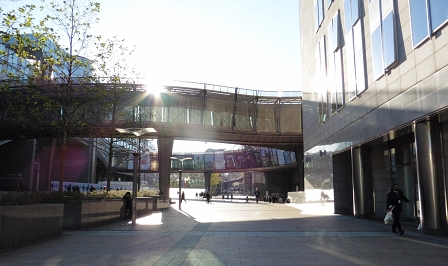
Chris Cummins
The catch is, of course, that lobbyists like Geiger, aren’t choosing their causes by the worthiness of the aims; he represents industries to pay him to do their bidding. When I ask him if he’d refuse a client on the basis of their murky record of obscuring the public health impact of their product, such as to tobacco industry, he answers:
"No. I’m a lawyer – an attorney – and coming from that perspective I understand everyone’s right to mount a defence. If you look at the situation you will always find a reason why a certain client has a certain interest and rightly so. Advocating for that is perfectly fine."
All Part Of The Democratic Game?
You could call NGOs such as Greenpeace or Friends of the Earth lobbyists too – they have the same aim of presenting expert advice to influence decisions to fit their strategies and philosophies. Tobacco companies have been excused of understating the scientific evidence of health damage, but Greenpeace has been accused of overegging the scientific evidence to back its mistrust of GMOs. Maybe, as in a court case, this is all part of the democratic game? Opposing sides can dispute facts - that's all part of the hustle and bustle of decision making.
"Industry has a bigger and louder voice"
What isn’t perfectly fine says Lora Verheecke, of the Brussels-based Corporate Europe Observatory, is the uneven playing surface. If we use Geiger’s courtroom analogy then the defence and prosecution should have equal access to the judge’s ear. NGOs and civil interest groups have access to the European Parliament, but Corporate Europe Observatory’s new data shows three-quarters of declared EU lobby meetings are with corporate players:
"What we see in the European Union is that the ones who are listened to are mostly lobbyists from industry and it is not a balanced view on any issue. Most of the time, industry has a bigger and louder voice than any public industry groups."
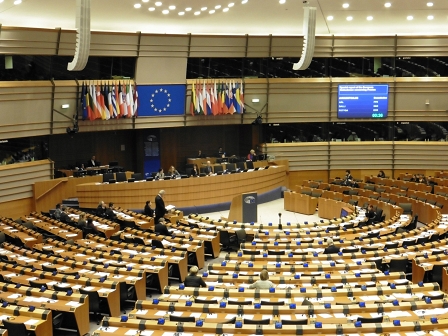
Chris Cummins
Environmental Protection Quashed
This seems to be having an effect. Documents gained by British Guardian newspaper via a Freedom of Information law show the oil company Shell successfully lobbied to undermine European renewable energy targets ahead of a key agreement on emissions cuts reached in October last year. And the same happened when it came to moves to impose a European wide plan to impose a ban on single use plastic bags.
Ariadna Rodrigo from Friends of the Earth Brussels: "There were a few NGOs like us pushing to introduce more radical measures that would have had an impact on the ground but there were so many companies outnumbering and with very clear demands." The motion to impose a Europe-wide ban was not passed.
"The influence of industry is far too great"
In 2013, leaked documents belonging to the tobacco giant Phillip Morris had held undisclosed lobby meetings with no less than 233 MEPs at a time when tobacco legislation was being discussed. Karl-Heinz Florenz, a Christian Democrat MEP, who condemned the lobbying methods as "leprosy for democracy".
Michel Reimon is an Austrian MEP for the Greens – he says that the NGOs are simply outnumber and the "influence of industry is far too great". According to Reimon, it is all about logistical capacity; if a certain issue is up for discussion, corporations can afford armies of lobbyists, on salaries of 5,000 euros a month, knocking on doors and attending meetings. The public interest groups don’t have that financial clout. "If I was to talk to every available lobbyist on any issue," says Reimon, "I’d spend 95% of my meetings talking to representatives of industry."
Ernst Strasser "massively harmed European politics" -
So the playing-field is not level. Yet, to keep my football analogy going, much worse is the suspicion that the referee might not be altogether impartial. What if MEPs accept cash for their legislative work?
It is a democratic nightmare, but a court decided that it was a reality at least in the case of Austrian former MEP, and former interior minister, Ernst Strasser. He was caught in a 2011 Sunday Times sting as he asked for a 100,000 euro fee from undercover reporters who were posing as lobbyists. In return he said he could influence EU legislation in the European Parliament.
Alexandra Maruna, the prosecutor at the Vienna court where Strasser was tried, said Strasser had "massively harmed European politics" and deserved to be punished for abusing confidence in elected officials.
"Dalligate - the power of big tobacco"
But was it a one off? No, says James Panichi, Politico’s lobby watcher. A scandal involving tobacco - this one called "Dalligate" - was equally as important in shaking our faith in European democracy at the beginning of this decade.
In October 2012 the EU commissioner for health, John Dalli, from Malta, resigned after an anti-fraud inquiry linked him to an attempt by a Maltese businessman to influence tobacco legislation. Sources say he was offered a "six-zero figure bribe" (Politico) to lift the EU's ban on a form of orally taken tobacco called snus.
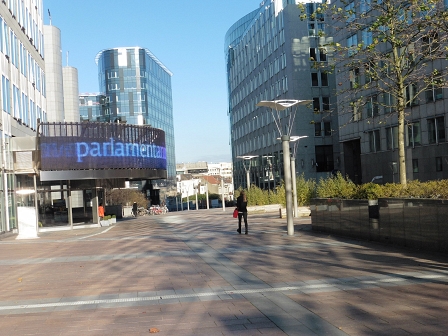
Chris Cummins
These scandals "placed the transparency register at the centre of the debate," says James Panichi, of POLITICO.eu. "The fact that we are talking about lobbying now and that I have a job as a journalistic observer of corporate lobbying in Brussels is a legacy of those moments."
"The public has the right to know what they are talking about"
In June 2011 the Transparency Register was created, a voluntary lobbyist register operated jointly by the European Parliament and the EU-Commission. As an incentive to sign up, only registered lobbyists are granted passes that guarantee easy access to the parliament.
But lobbying doesn’t only take place in official buildings and Lora Verheecke says the register is too weak. "Only 7,000 lobbyists are registered on the transparency register but we estimate that there up to 30,000 lobbyists in Brussels. That means we only know what a quarter of them are doing."
She says EU officials should be banned from meeting with unregistered lobbyists and that the minutes of meetings with corporate lobbyists should be published online. "The public has a right to know what they are talking about," she says.
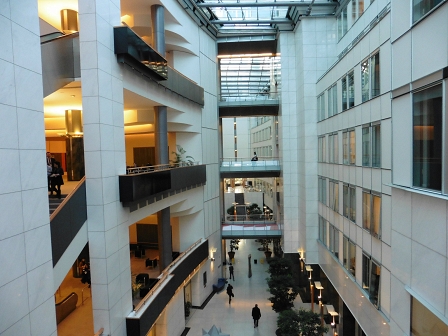
Chris Cummins
That power can affect our health, says Daniel Moser of Greenpeace. Since the Volkswagen emission cheating scandal broke, car makers have been furiously lobbying politicians to raise the legal limits instead of punishing the excesses. Moser points out that VW spends 3 million euros a year lobbying officials in Brussels and if that money is spent on attempts to water down environmental or health protection, then this should be out in the open.
We need reassurance
So who owns Brussels: the voting public or big business? The feeling that our votes simply don’t count for much is one of the factors that has seen voter participation dip below 30% in European Parliament elections in some countries. We need reassurance. James Panichi, lobby watcher from Politico has this to offer:
"What I can say to people is that small steps are being made every day towards an ever greater level of transparency. It’s just a matter of the public keeping up the pressure and journalists demanding answers from the powers that be. One step at a time we’re getting to the stage where we can assess the impact of lobbyists in a fair, clear and transparent way."


